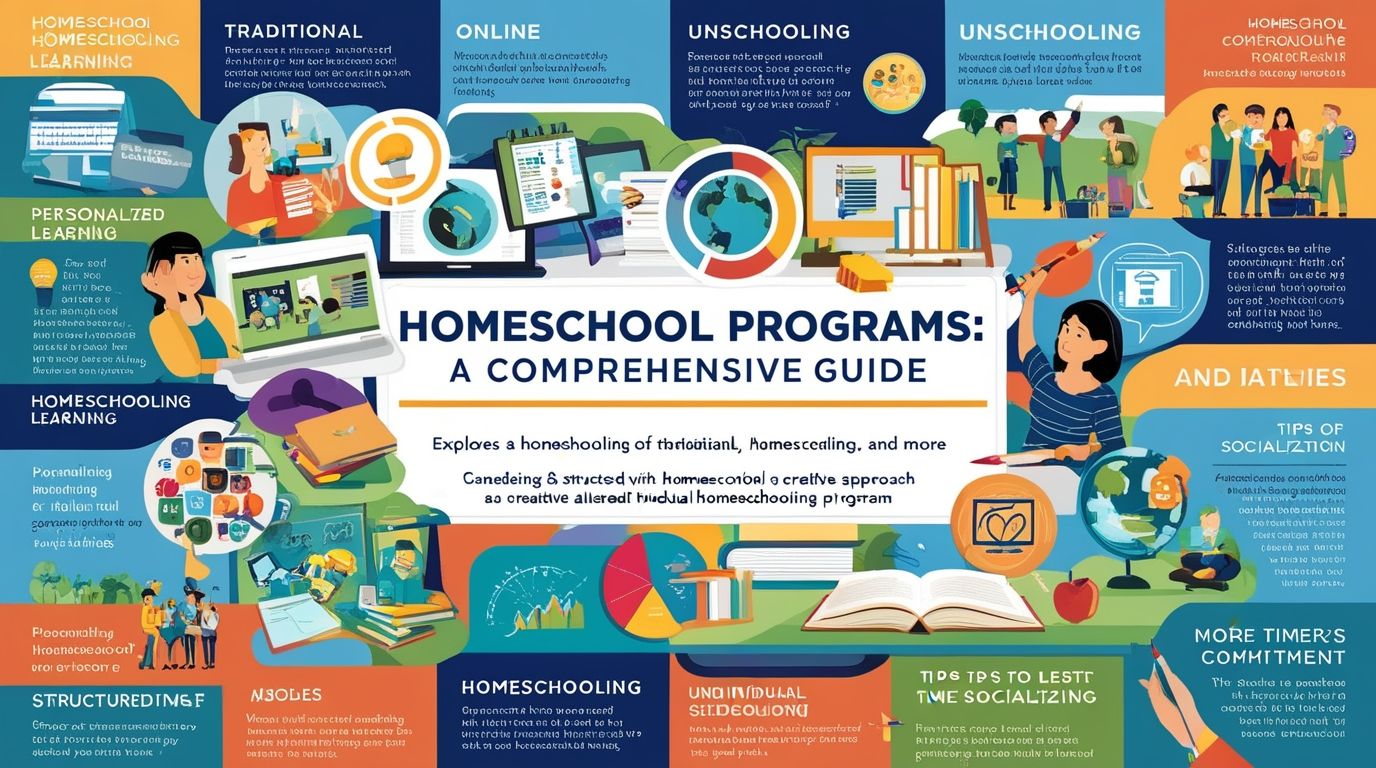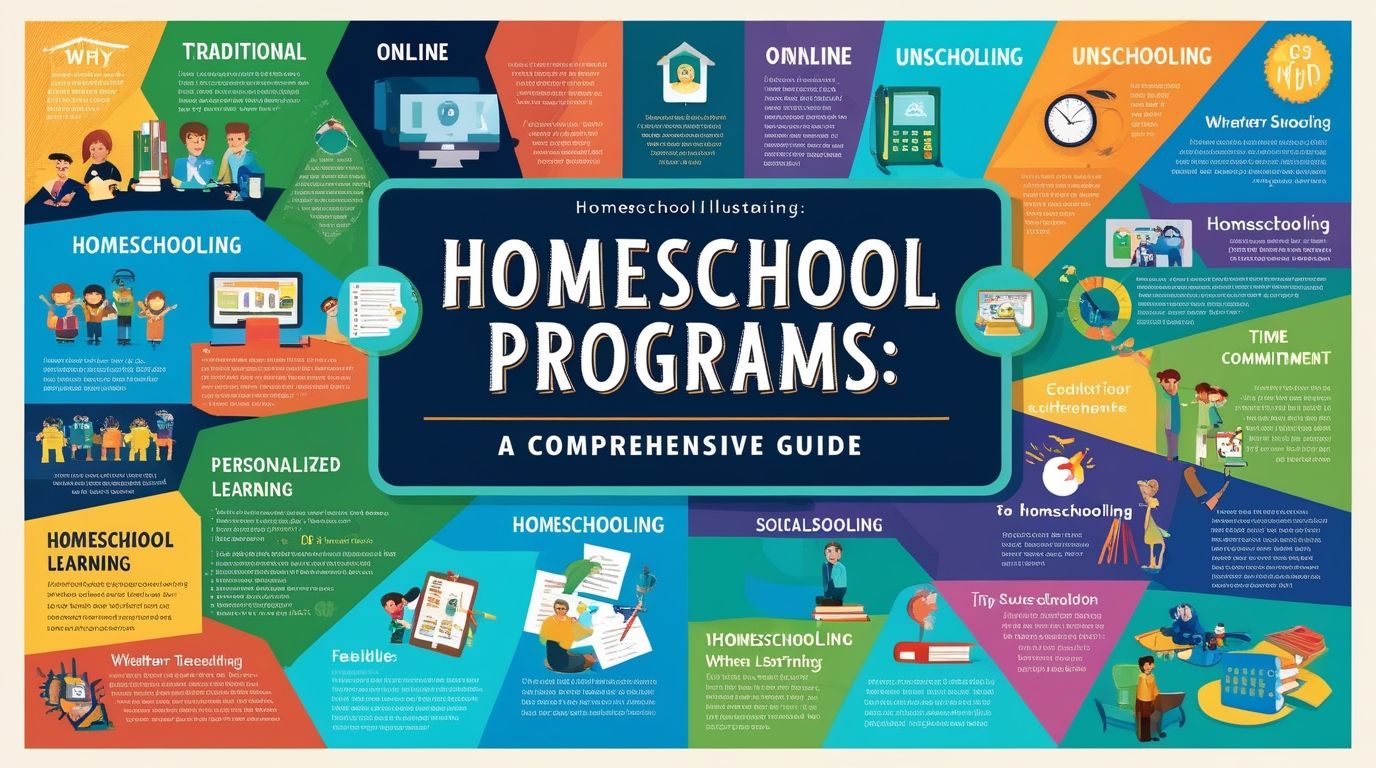Homeschool Programs a Comprehensive Guide, Homeschooling has emerged as a growing educational alternative, offering families the flexibility to tailor their children’s learning experience according to individual needs and values. With the rise of accessible technology and dissatisfaction with traditional schooling, more parents are opting to homeschool their children. This article explores various aspects of homeschool programs, their types, benefits, challenges, and tips for successful homeschooling.
1. Types of Homeschool Programs
Homeschool programs come in various forms, depending on the educational philosophy, curriculum, and structure. These types allow families to choose a program that aligns with their values, children’s learning styles, and goals.
a) Traditional Homeschooling
Traditional homeschooling follows a similar approach to public or private schooling, but the learning occurs at home. Parents act as the primary educators, using textbooks, lesson plans, and tests. Often, traditional homeschoolers use curriculum packages that cover all subjects, providing a structured and comprehensive educational experience. These programs typically mirror a traditional school setting, complete with schedules and assignments.
b) Online Homeschool Programs
Online homeschooling programs are increasing in popularity due to advancements in technology. These programs provide digital resources, video lessons, interactive activities, and assessments, making them an excellent option for tech-savvy learners. Accredited online homeschool programs often allow students to earn recognized diplomas. Examples include K12 and Time4Learning, which offer courses from elementary through high school.
c) Unschooling
Unschooling is a more unconventional and child-led approach to homeschooling. It emphasizes experiential learning rather than following a fixed curriculum. Children pursue their interests, and learning happens organically through life experiences, hobbies, and activities. The philosophy of unschooling is based on the belief that children are naturally curious and learn best when they are not confined by a rigid curriculum.
d) Unit Studies
Unit studies approach learning in an interdisciplinary manner by focusing on a specific theme or subject area. A single topic is explored from multiple angles—history, science, literature, and art—helping students see the interconnectedness of knowledge. For example, if studying Ancient Egypt, students might delve into its history, geography, myths, architecture, and scientific achievements. This holistic approach can be engaging and immersive for students.
e) Charlotte Mason Method
Developed by British educator Charlotte Mason, this method focuses on creating a well-rounded education based on exposure to “living books” (books that make subjects come alive) rather than dry textbooks. The Charlotte Mason method emphasizes short lessons, narration (students recount what they’ve learned), nature studies, and the arts. This approach cultivates curiosity and appreciation for the natural world and literature.
f) Classical Education
Classical education is rooted in the ancient Greek and Roman tradition of teaching the Trivium, which consists of three stages: grammar (learning facts), logic (learning to reason), and rhetoric (learning to communicate). This method often includes studying Latin, logic, and great classical works of literature and philosophy. Many families prefer classical education for its emphasis on critical thinking and strong communication skills.
g) Montessori Homeschooling
The Montessori method, founded by Maria Montessori, focuses on hands-on learning and allowing children to explore their environments at their own pace. Montessori homeschooling encourages independent learning, self-discipline, and respect for a child’s natural development. Materials are designed to foster sensory experiences, and the role of the parent is to guide rather than directly instruct.
2. Benefits of Homeschool Programs
Homeschooling offers several advantages, making it an attractive option for many families.

a) Individualized Learning
One of the greatest benefits of homeschooling is the ability to provide a customized education tailored to a child’s specific learning style, pace, and interests. Parents can adjust the curriculum to emphasize strengths or spend more time on areas where their child needs additional support. This flexibility fosters a more personalized and effective learning experience.
b) Flexible Scheduling
Homeschooling allows families to break away from the rigid schedules of traditional schools. This flexibility can accommodate family trips, medical appointments, or extracurricular activities. Additionally, students who excel in certain subjects can move ahead more quickly, while those who struggle with particular topics can take the time they need to master them.
c) Safety and Emotional Well-Being
For families concerned about bullying, peer pressure, or other negative social influences, homeschooling provides a safe and supportive learning environment. Children can focus on their education without the distractions or emotional stress that sometimes accompany traditional schooling. Parents also have greater control over their child’s social interactions, ensuring they can choose healthy and positive relationships.
d) Focus on Values and Worldview
Homeschooling allows parents to incorporate their values, beliefs, and worldview into their children’s education. This is particularly important for families who wish to emphasize religious or moral teachings that may not be present in public or private schools. Homeschooling gives parents the ability to shape their children’s education in alignment with their cultural or spiritual values.
e) Stronger Family Bonds
Homeschooling encourages more time spent together as a family. This increased interaction can lead to stronger relationships and a deeper understanding of each other. The involvement of parents in their children’s education fosters closer bonds and opens opportunities for learning together through real-life experiences.
3. Challenges of Homeschool Programs
While homeschooling offers many benefits, it is not without challenges. Understanding these challenges helps parents make informed decisions and prepare for the homeschooling journey.
a) Time and Commitment
Homeschooling requires a significant time investment from parents, especially those who act as the primary educators. This can be challenging for working parents or those with multiple children. Planning lessons, grading assignments, and ensuring that educational goals are met can be time-consuming and exhausting.
b) Financial Costs
Homeschooling can sometimes be more expensive than traditional schooling, particularly if parents opt for specialized curriculum packages, online programs, or private tutors. Additionally, since one parent often stays home to teach, this may result in a loss of income for dual-income households.
c) Socialization
One of the most frequently cited concerns about homeschooling is the potential lack of socialization with peers. Traditional schools offer a built-in social environment, while homeschoolers may need to seek out extracurricular activities, co-ops, or community groups to provide opportunities for social interaction. However, many homeschool families actively participate in sports teams, clubs, and other social activities to ensure their children develop social skills.
d) Access to Resources
Homeschooling families may not have access to the same resources as traditional schools, such as science labs, sports facilities, or specialized teachers. Although many communities offer homeschool co-ops and support groups to address these gaps, it can still be a challenge for parents to provide a well-rounded education.
4. Tips for Successful Homeschooling
For families considering homeschooling, the following tips can help ensure a smooth and successful experience:
a) Create a Routine
While flexibility is one of homeschooling’s benefits, having a daily routine can help maintain consistency and structure. A well-planned schedule helps students know what to expect each day and ensures that educational goals are met.
b) Join Homeschool Groups or Co-Ops
Homeschool groups or co-ops provide a sense of community for both parents and students. These groups offer opportunities for socialization, field trips, group learning, and shared resources. Co-ops also allow parents to share teaching responsibilities, reducing the burden on any one family.
c) Incorporate Hands-On Learning
Incorporating hands-on activities, experiments, and real-world experiences can make learning more engaging and enjoyable. Homeschooling allows for creative approaches to education, such as field trips to museums, nature walks, or practical life skills lessons.
d) Be Flexible and Patient
Every child learns at their own pace, so it’s important to remain flexible and patient. Homeschooling allows for customization, so if a child is struggling with a particular subject, take the time needed to help them understand it without feeling rushed.
e) Stay Organized
Keeping track of lesson plans, progress, and assessments is crucial for successful homeschooling. Utilize planners, apps, or other organizational tools to ensure that educational goals are met and that records are kept for future reference.
Conclusion
Homeschooling offers a dynamic and flexible educational option that is becoming more popular among families seeking individualized learning experiences for their children. With various homeschool programs to choose from—ranging from traditional curriculums to child-led approaches like unschooling—there is a model to fit almost every educational philosophy and lifestyle. While homeschooling presents challenges, such as time commitment and socialization concerns, it also offers the unique benefits of personalized learning, family bonding, and a safe educational environment. Families who are well-prepared and organized can make homeschooling a rewarding and enriching experience for both parents and children.
References:
- Ray, B. D. (2020). Homeschooling: The Research. National Home Education Research Institute.
- Holt, J. (1989). Teach Your Own: The John Holt Book of Homeschooling. Da Capo Press.
- Collom, E. (2005). The Ins and Outs of Homeschooling. Education and Urban Society, 37(3), 307-335.
- Beck, C. W., & Barendregt, C. (2010). Homeschooling for Success: How Parents Can Create a Superior Education for Their Child. Grand Central Publishing.

4 thoughts on “Homeschool Programs a Comprehensive Guide”
Comments are closed.